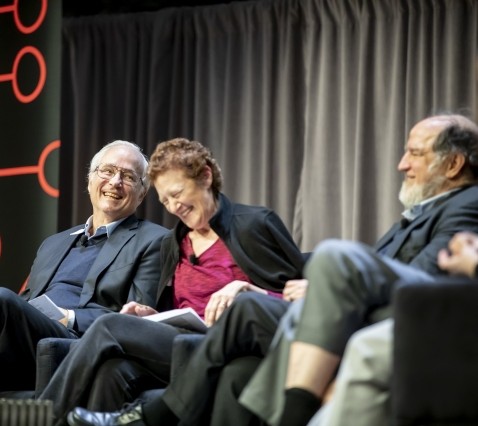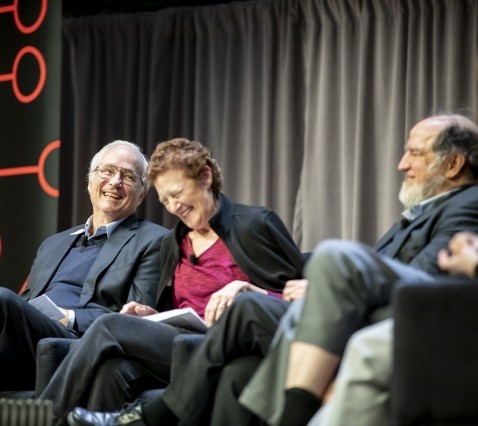Setting their sights
Six Turing laureates who pushed for a college of computing wrestle with the future of their field.



Sitting center stage in a ruby-red blouse, Institute Professor Barbara Liskov grinned as she read from a letter that began with this weighty pronouncement: “There comes a time, in the course of scientific evolution, when a discipline is ready to emerge from the womb of its parent disciplines and take its own place in the world.” Nodding along beside her were five fellow MIT professors—coauthors of the 2017 open letter to President L. Rafael Reif calling for the creation of a school of computing. Just 17 months after penning the letter, six of the seven signers (Silvio Micali couldn’t make it) gathered at Kresge in February to discuss the new MIT Stephen A. Schwarzman College of Computing.
As they explained the contributions that won them each an A.M. Turing Award, often called the “Nobel Prize of computing,” it became clear that the path to our current digital reality wasn’t inevitable, or even obvious.
“It’s always been a surprise to me that databases are so omnipresent,” said “database guy” Michael Stonebraker, lead inventor of arguably the most popular open-source enterprise data management system on the planet.
“At PARC we invented pretty much every aspect of personal computing that isn’t closely connected to the web,” said Butler Lampson. Except spreadsheets, he added, because “we didn’t see any use for them.”
A simple task like paying a bill online illustrates some of their work: You turn on your PC (thanks, Lampson), go to a website (courtesy of Tim Berners-Lee), and send your credit card data securely (Ronald Rivest is the R in the cryptographic RSA algorithm) so your transaction can be stored in a database (made possible by Stonebraker), using software likely written with Liskov’s methods.
But advances in computer science can quickly be taken for granted. Liskov recalled, to a swell of laughter, an online comment her husband spotted after her 2008 Turing win for her contributions to programming language and system design: “What did she get the award for? Everybody knows this anyway.”
When the conversation turned to opportunities for computer science in the next 20 years, the mood changed.
With climate change and “social climate change” to consider, Berners-Lee said, researchers should collaborate with sociologists, economists, and others to anticipate the unintended consequences of their work.
Liskov, too, worries about unintended consequences, pointing to existing technology. “We were awfully naïve when we developed it,” she said. “But I also think that we simply had no idea how badly people could misbehave.”
Cryptographer Shafi Gold-wasser talked of a power shift now that algorithms, not humans, are making decisions about things like medical diagnoses, loans, and bail. And data can fall into the wrong hands. “Access to data is what gives systems their power,” she said, so we mustn’t “just give it away.”
Over and over, the panelists said the next generation of computer scientists must learn from other disciplines—and also arm those disciplines with the computational knowledge they need. Decades on from their own pioneering work, they see a field that can address climate change, improve health care, and educate politicians. As their letter says, the time for it to take its place is now.